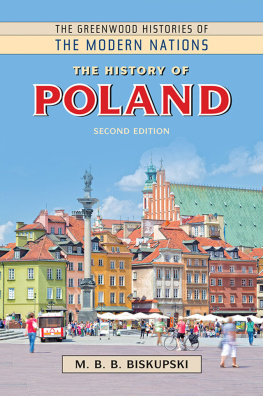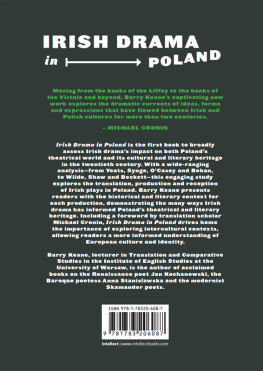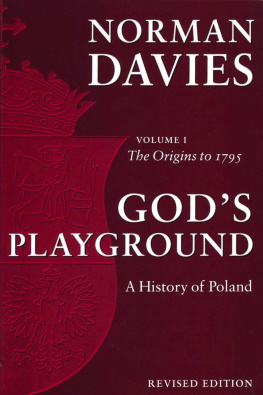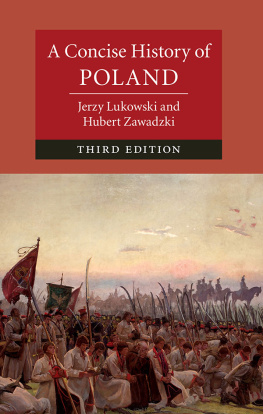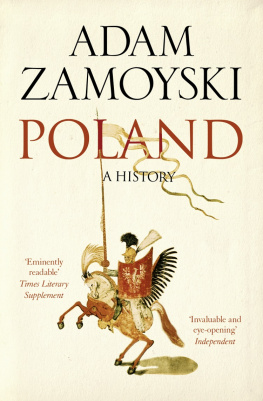THE HISTORY OF POLAND
Advisory Board
John T. Alexander
Professor of History and Russian and European Studies,
University of Kansas
Robert A. Divine
George W. Littlefield Professor in American History Emeritus,
University of Texas at Austin
John V. Lombardi
Professor of History,
University of Florida
THE HISTORY OF POLAND
Second Edition
M. B. B. Biskupski
The Greenwood Histories of the Modern Nations
Frank W. Thackeray and John E. Findling, Series Editors
Copyright 2018 by ABC-CLIO, LLC
All rights reserved. No part of this publication may be reproduced, stored in a retrieval system, or transmitted, in any form or by any means, electronic, mechanical, photocopying, recording, or otherwise, except for the inclusion of brief quotations in a review, without prior permission in writing from the publisher.
Library of Congress Cataloging-in-Publication Data
Names: Biskupski, Mieczysaw B., author.
Title: The History of Poland : M. B. B. Biskupski.
Description: Second edition. | Santa Barbara, California : Greenwood, 2018. | Series: Greenwood histories of the modern nations | Includes bibliographical references and index.
Identifiers: LCCN 2018023289 (print) | LCCN 2018024565 (ebook) | ISBN 9781440862267 (ebook) | ISBN 9781440862250 (alk. paper)
Subjects: LCSH: PolandHistory.
Classification: LCC DK4140 (ebook) | LCC DK4140 .B57 2018 (print) | DDC 943.8dc23
LC record available at https://lccn.loc.gov/2018023289
ISBN: 978-1-4408-6225-0 (print)
978-1-4408-6226-7 (ebook)
22 21 20 19 18 1 2 3 4 5
This book is also available as an eBook.
Greenwood
An Imprint of ABC-CLIO, LLC
ABC-CLIO, LLC
130 Cremona Drive, P.O. Box 1911
Santa Barbara, California 93116-1911
www.abc-clio.com
This book is printed on acid-free paper 
Manufactured in the United States of America
KSIAZKE TE DEDYKUJE MOIM NAJMODSZYM DZIECIOM, MISI I STASIOWI. BYC ICH OJCEM JEST DAREM BOZYM.
Contents
by Frank W. Thackeray and John E. Findling
The Greenwood Histories of the Modern Nations series is intended to provide students and interested laypeople with up-to-date, concise, and analytical histories of many of the nations of the contemporary world. Not since the 1960s has there been a systematic attempt to publish a series of national histories, and as series editors, we believe that this series will prove to be a valuable contribution to our understanding of other countries in our increasingly interdependent world. At the end of the 1960s, the Cold War was an accepted reality of global politics. The process of decolonization was still in progress, the idea of a unified Europe with a single currency was unheard of, the United States was mired in a war in Vietnam, and the economic boom in Asia was still years in the future. Richard Nixon was president of the United States, Mao Tse-tung (not yet Mao Zedong) ruled China, Leonid Brezhnev guided the Soviet Union, and Harold Wilson was prime minister of the United Kingdom. Authoritarian dictators still controlled most of Latin America, the Middle East was reeling in the wake of the Six-Day War, and Shah Mohammad Reza Pahlavi was at the height of his power in Iran.
Since then, the Cold War has ended, the Soviet Union has vanished, leaving 15 independent republics in its wake, the advent of the computer age has radically transformed global communications, the rising demand for oil makes the Middle East still a dangerous flashpoint, and the rise of new economic powers like the Peoples Republic of China and India threatens to bring about a new world order. All of these developments have had a dramatic impact on the recent history of every nation of the world.
For this series, which was launched in 1998, we first selected nations whose political, economic, and socio-cultural affairs marked them as among the most important of our time. For each nation, we found an author who was recognized as a specialist in the history of that nation. These authors worked cooperatively with us and with Greenwood Press to produce volumes that reflected current research on their nations and that are interesting and informative to their readers. In the first decade of the series, close to 50 volumes were published, and some have now moved into second editions.
The success of the series has encouraged us to broaden our scope to include additional nations, whose histories have had significant effects on their regions, if not on the entire world. In addition, geopolitical changes have elevated other nations into positions of greater importance in world affairs and, so, we have chosen to include them in this series as well. The importance of a series such as this cannot be underestimated. As a superpower whose influence is felt all over the world, the United States can claim a special relationship with almost every other nation. Yet many Americans know very little about the histories of nations with which the United States relates. How did they get to be the way they are? What kind of political systems have evolved there? What kind of influence do they have on their own regions? What are the dominant political, religious, and cultural forces that move their leaders? These and many other questions are answered in the volumes of this series.
The authors who contribute to this series write comprehensive histories of their nations, dating back, in some instances, to prehistoric times. Each of them, however, has devoted a significant portion of their book to events of the past 40 years because the modern era has contributed the most to contemporary issues that have an impact on U.S. policy. Authors make every effort to be as up-to-date as possible so that readers can benefit from discussion and analysis of recent events.
In addition to the historical narrative, each volume contains an introductory chapter giving an overview of that countrys geography, political institutions, economic structure, and cultural attributes. This is meant to give readers a snapshot of the nation as it exists in the contemporary world. Each history also includes supplementary information following the narrative, which may include a timeline that represents a succinct chronology of the nations historical evolution, biographical sketches of the nations most important historical figures, and a glossary of important terms or concepts that are usually expressed in a foreign language. Finally, each author prepares a comprehensive bibliography for readers who wish to pursue the subject further.
Readers of these volumes will find them fascinating and well written. More importantly, they will come away with a better understanding of the contemporary world and the nations that comprise it. As series editors, we hope that this series will contribute to a heightened sense of global understanding as we move through the early years of the twenty-first century.
Frank W. Thackeray and John E. Findling
Indiana University Southeast
This is a particularly opportune moment to make a new attempt at interpreting the Polish past. With the fall of Communism, the collapse of the Soviet Empire, the reunification of Germany, an increasingly aggressive EU, and the restructuring of the security and economic architecture of Europe, the world is strikingly different from what it was just a few years ago. Poland, which has reemerged as an independent nation after nearly half a century of Communism and Russian control, is within this altered context both a new and restored country. Hence, the relationship of todays Poland to the countrys previous incarnations is a serious and challenging question. Historians, like everyone else, are inclined to a Whiggish view of affairs, seeing the present as the inevitable product of the past. When Poland was a rather pitiable member of the Warsaw Pact, its economy perpetually in shambles, it was almost unavoidable to see in the past a kind of attenuated prologue to modern national tragedy or at least to national inconsequentiality. Now, with Poland returning to play a lively role in the world, we are well moved to rummage about the past again, this time with a happier mission, seeing failure as variation, not theme. But renewed independence has brought new, or returning, problems, and the future of the country is controversial and major problems require immediate and serious attention. The future is problematical indeed.

